
CosyVoice
LLM based TTS model, providing inference/training/deployment full-stack ability.
Stars: 328
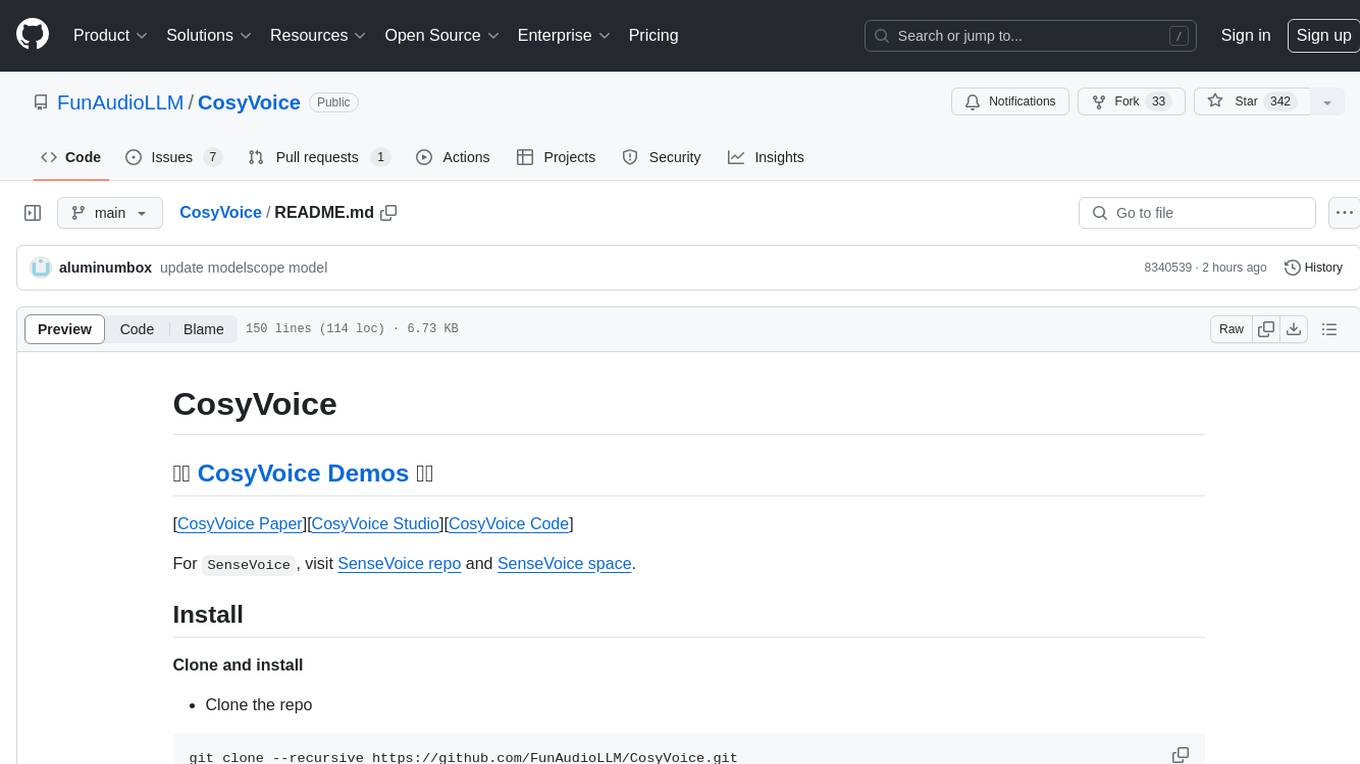
CosyVoice is a tool designed for speech synthesis, offering pretrained models for zero-shot, sft, instruct inference. It provides a web demo for easy usage and supports advanced users with train and inference scripts. The tool can be deployed using grpc for service deployment. Users can download pretrained models and resources for immediate use or train their own models from scratch. CosyVoice is suitable for researchers, developers, linguists, AI engineers, and speech technology enthusiasts.
README:
👉🏻 CosyVoice Demos 👈🏻
[CosyVoice Paper][CosyVoice Studio][CosyVoice Code]
For SenseVoice, visit SenseVoice repo and SenseVoice space.
Clone and install
- Clone the repo
git clone --recursive https://github.com/FunAudioLLM/CosyVoice.git
# If you failed to clone submodule due to network failures, please run following command until success
cd CosyVoice
git submodule update --init --recursive- Install Conda: please see https://docs.conda.io/en/latest/miniconda.html
- Create Conda env:
conda create -n cosyvoice python=3.8
conda activate cosyvoice
pip install -r requirements.txt -i https://mirrors.aliyun.com/pypi/simple/ --trusted-host=mirrors.aliyun.com
# If you encounter sox compatibility issues
# ubuntu
sudo apt-get install sox libsox-dev
# centos
sudo yum install sox sox-develModel download
We strongly recommand that you download our pretrained CosyVoice-300M CosyVoice-300M-SFT CosyVoice-300M-Instruct model and speech_kantts_ttsfrd resource.
If you are expert in this field, and you are only interested in training your own CosyVoice model from scratch, you can skip this step.
# SDK模型下载
from modelscope import snapshot_download
snapshot_download('speech_tts/CosyVoice-300M', local_dir='pretrained_models/CosyVoice-300M')
snapshot_download('speech_tts/CosyVoice-300M-SFT', local_dir='pretrained_models/CosyVoice-300M-SFT')
snapshot_download('speech_tts/CosyVoice-300M-Instruct', local_dir='pretrained_models/CosyVoice-300M-Instruct')
snapshot_download('speech_tts/speech_kantts_ttsfrd', local_dir='pretrained_models/speech_kantts_ttsfrd')# git模型下载,请确保已安装git lfs
mkdir -p pretrained_models
git clone https://www.modelscope.cn/speech_tts/CosyVoice-300M.git pretrained_models/CosyVoice-300M
git clone https://www.modelscope.cn/speech_tts/CosyVoice-300M-SFT.git pretrained_models/CosyVoice-300M-SFT
git clone https://www.modelscope.cn/speech_tts/CosyVoice-300M-Instruct.git pretrained_models/CosyVoice-300M-Instruct
git clone https://www.modelscope.cn/speech_tts/speech_kantts_ttsfrd.git pretrained_models/speech_kantts_ttsfrdUnzip ttsfrd resouce and install ttsfrd package
cd pretrained_models/speech_kantts_ttsfrd/
unzip resource.zip -d .
pip install ttsfrd-0.3.6-cp38-cp38-linux_x86_64.whlBasic Usage
For zero_shot/cross_lingual inference, please use CosyVoice-300M model.
For sft inference, please use CosyVoice-300M-SFT model.
For instruct inference, please use CosyVoice-300M-Instruct model.
First, add third_party/AcademiCodec and third_party/Matcha-TTS to your PYTHONPATH.
export PYTHONPATH=third_party/AcademiCodec:third_party/Matcha-TTSfrom cosyvoice.cli.cosyvoice import CosyVoice
from cosyvoice.utils.file_utils import load_wav
import torchaudio
cosyvoice = CosyVoice('speech_tts/CosyVoice-300M-SFT')
# sft usage
print(cosyvoice.list_avaliable_spks())
output = cosyvoice.inference_sft('你好,我是通义生成式语音大模型,请问有什么可以帮您的吗?', '中文女')
torchaudio.save('sft.wav', output['tts_speech'], 22050)
cosyvoice = CosyVoice('speech_tts/CosyVoice-300M')
# zero_shot usage
prompt_speech_16k = load_wav('zero_shot_prompt.wav', 16000)
output = cosyvoice.inference_zero_shot('收到好友从远方寄来的生日礼物,那份意外的惊喜与深深的祝福让我心中充满了甜蜜的快乐,笑容如花儿般绽放。', '希望你以后能够做的比我还好呦。', prompt_speech_16k)
torchaudio.save('zero_shot.wav', output['tts_speech'], 22050)
# cross_lingual usage
prompt_speech_16k = load_wav('cross_lingual_prompt.wav', 16000)
output = cosyvoice.inference_cross_lingual('<|en|>And then later on, fully acquiring that company. So keeping management in line, interest in line with the asset that\'s coming into the family is a reason why sometimes we don\'t buy the whole thing.', prompt_speech_16k)
torchaudio.save('cross_lingual.wav', output['tts_speech'], 22050)
cosyvoice = CosyVoice('speech_tts/CosyVoice-300M-Instruct')
# instruct usage
output = cosyvoice.inference_instruct('在面对挑战时,他展现了非凡的<strong>勇气</strong>与<strong>智慧</strong>。', '中文男', 'Theo \'Crimson\', is a fiery, passionate rebel leader. Fights with fervor for justice, but struggles with impulsiveness.')
torchaudio.save('instruct.wav', output['tts_speech'], 22050)Start web demo
You can use our web demo page to get familiar with CosyVoice quickly. We support sft/zero_shot/cross_lingual/instruct inference in web demo.
Please see the demo website for details.
# change speech_tts/CosyVoice-300M-SFT for sft inference, or speech_tts/CosyVoice-300M-Instruct for instruct inference
python3 webui.py --port 50000 --model_dir speech_tts/CosyVoice-300MAdvanced Usage
For advanced user, we have provided train and inference scripts in examples/libritts/cosyvoice/run.sh.
You can get familiar with CosyVoice following this recipie.
Build for deployment
Optionally, if you want to use grpc for service deployment, you can run following steps. Otherwise, you can just ignore this step.
cd runtime/python
docker build -t cosyvoice:v1.0 .
# change speech_tts/CosyVoice-300M to speech_tts/CosyVoice-300M-Instruct if you want to use instruct inference
docker run -d --runtime=nvidia -p 50000:50000 cosyvoice:v1.0 /bin/bash -c "cd /opt/CosyVoice/CosyVoice/runtime/python && python3 server.py --port 50000 --max_conc 4 --model_dir speech_tts/CosyVoice-300M && sleep infinity"
python3 client.py --port 50000 --mode <sft|zero_shot|cross_lingual|instruct>You can directly discuss on Github Issues.
You can also scan the QR code to join our officla Dingding chat group.
- We borrowed a lot of code from FunASR.
- We borrowed a lot of code from FunCodec.
- We borrowed a lot of code from Matcha-TTS.
- We borrowed a lot of code from AcademiCodec.
- We borrowed a lot of code from WeNet.
The content provided above is for academic purposes only and is intended to demonstrate technical capabilities. Some examples are sourced from the internet. If any content infringes on your rights, please contact us to request its removal.
For Tasks:
Click tags to check more tools for each tasksFor Jobs:
Alternative AI tools for CosyVoice
Similar Open Source Tools

CosyVoice
CosyVoice is a tool designed for speech synthesis, offering pretrained models for zero-shot, sft, instruct inference. It provides a web demo for easy usage and supports advanced users with train and inference scripts. The tool can be deployed using grpc for service deployment. Users can download pretrained models and resources for immediate use or train their own models from scratch. CosyVoice is suitable for researchers, developers, linguists, AI engineers, and speech technology enthusiasts.
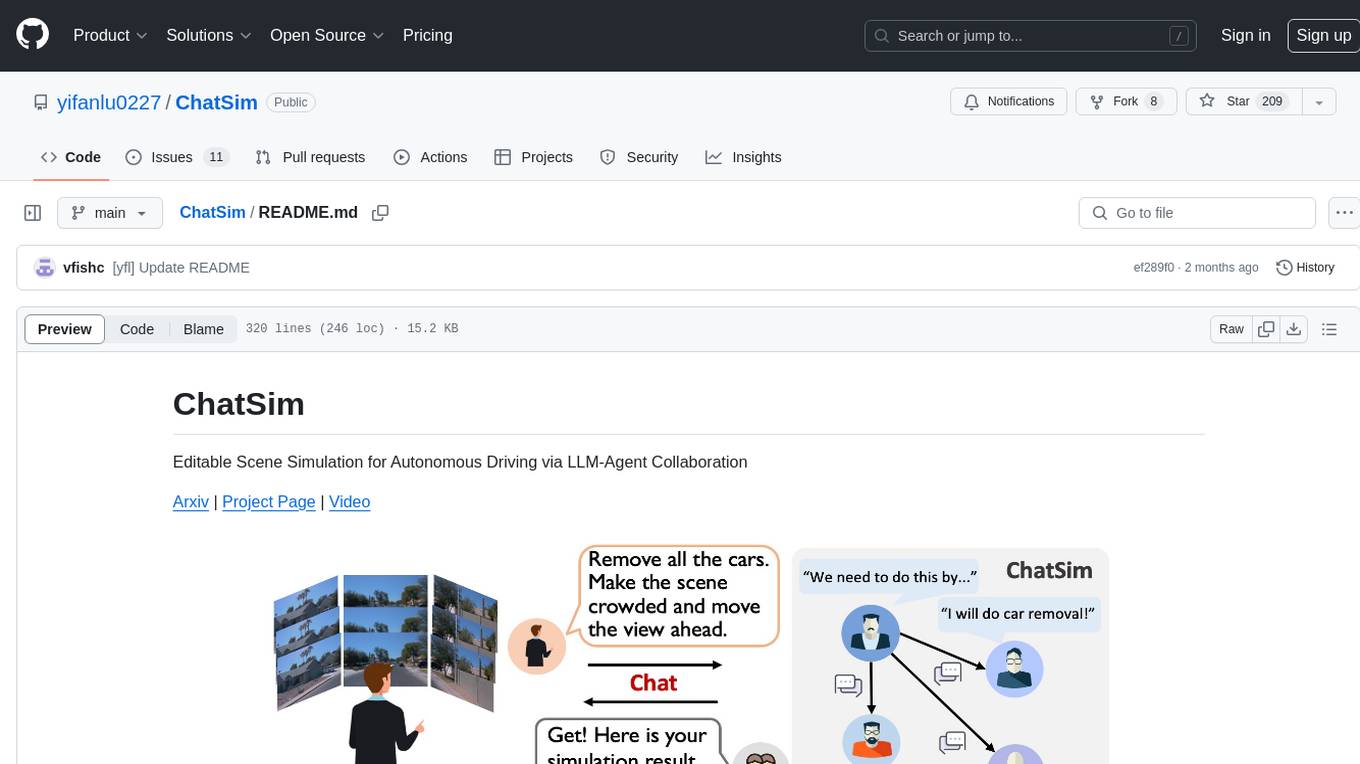
ChatSim
ChatSim is a tool designed for editable scene simulation for autonomous driving via LLM-Agent collaboration. It provides functionalities for setting up the environment, installing necessary dependencies like McNeRF and Inpainting tools, and preparing data for simulation. Users can train models, simulate scenes, and track trajectories for smoother and more realistic results. The tool integrates with Blender software and offers options for training McNeRF models and McLight's skydome estimation network. It also includes a trajectory tracking module for improved trajectory tracking. ChatSim aims to facilitate the simulation of autonomous driving scenarios with collaborative LLM-Agents.
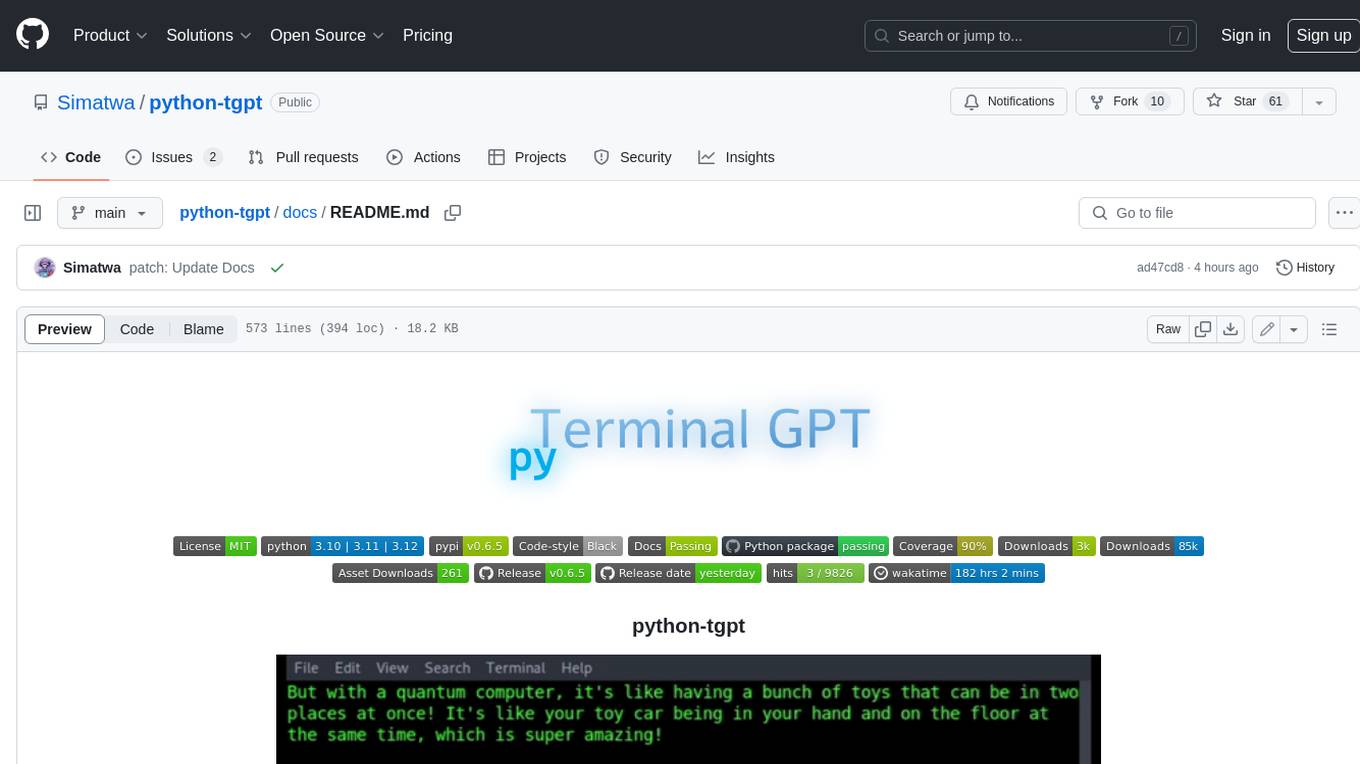
python-tgpt
Python-tgpt is a Python package that enables seamless interaction with over 45 free LLM providers without requiring an API key. It also provides image generation capabilities. The name _python-tgpt_ draws inspiration from its parent project tgpt, which operates on Golang. Through this Python adaptation, users can effortlessly engage with a number of free LLMs available, fostering a smoother AI interaction experience.
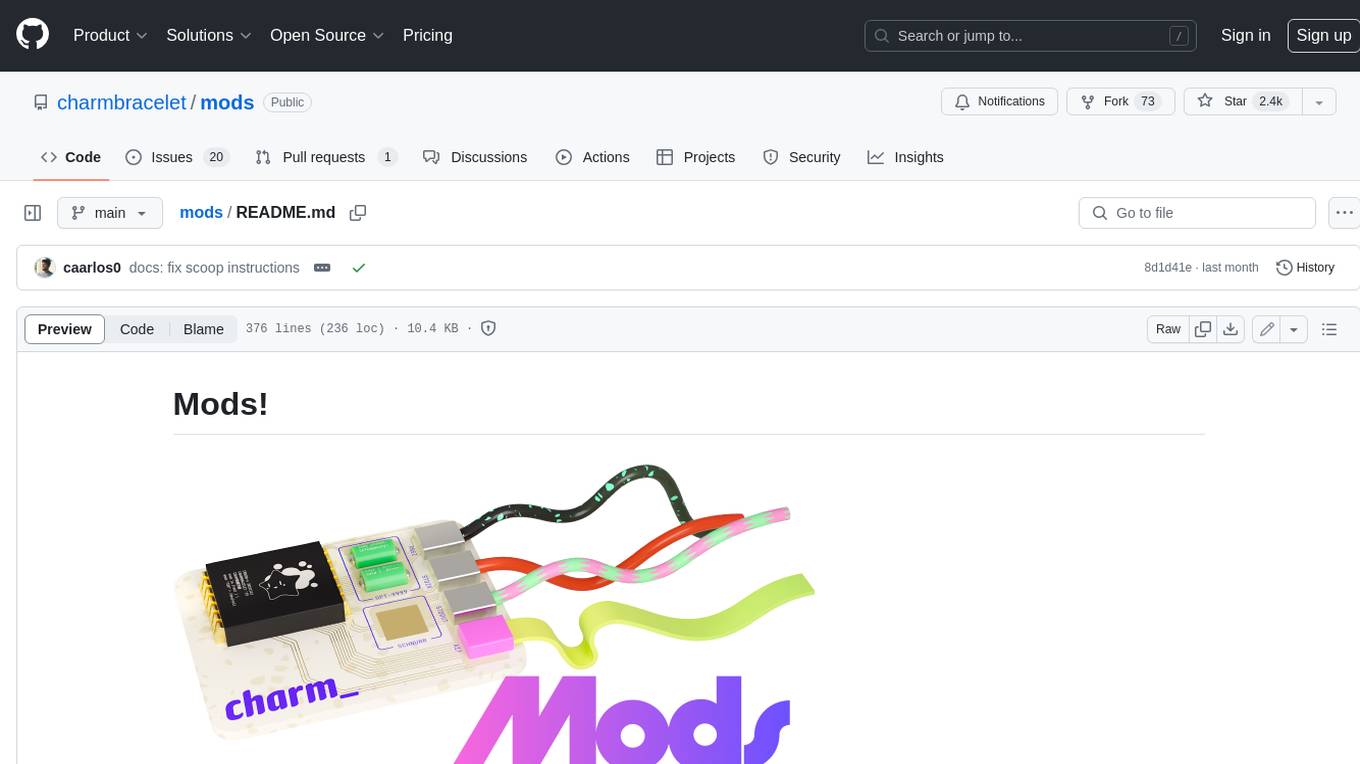
mods
AI for the command line, built for pipelines. LLM based AI is really good at interpreting the output of commands and returning the results in CLI friendly text formats like Markdown. Mods is a simple tool that makes it super easy to use AI on the command line and in your pipelines. Mods works with OpenAI, Groq, Azure OpenAI, and LocalAI To get started, install Mods and check out some of the examples below. Since Mods has built-in Markdown formatting, you may also want to grab Glow to give the output some _pizzazz_.
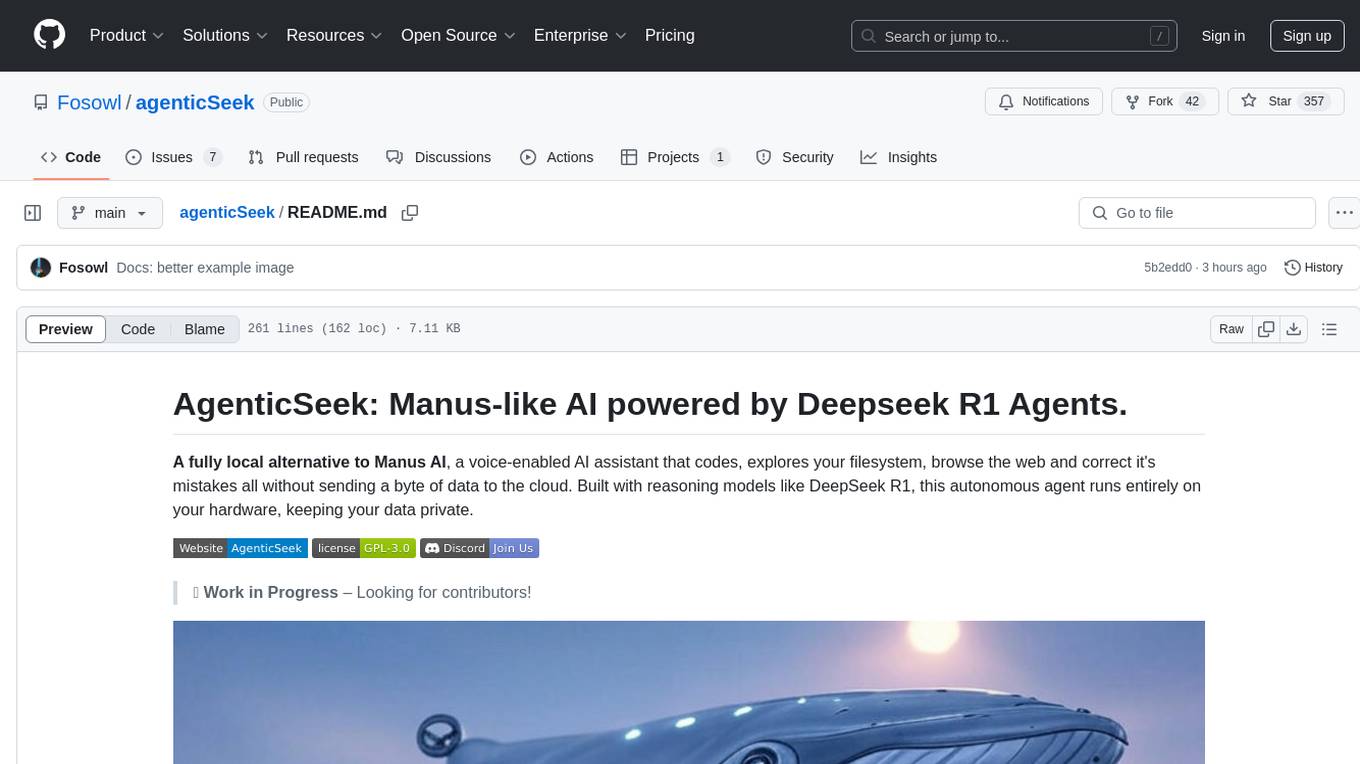
agenticSeek
AgenticSeek is a voice-enabled AI assistant powered by DeepSeek R1 agents, offering a fully local alternative to cloud-based AI services. It allows users to interact with their filesystem, code in multiple languages, and perform various tasks autonomously. The tool is equipped with memory to remember user preferences and past conversations, and it can divide tasks among multiple agents for efficient execution. AgenticSeek prioritizes privacy by running entirely on the user's hardware without sending data to the cloud.
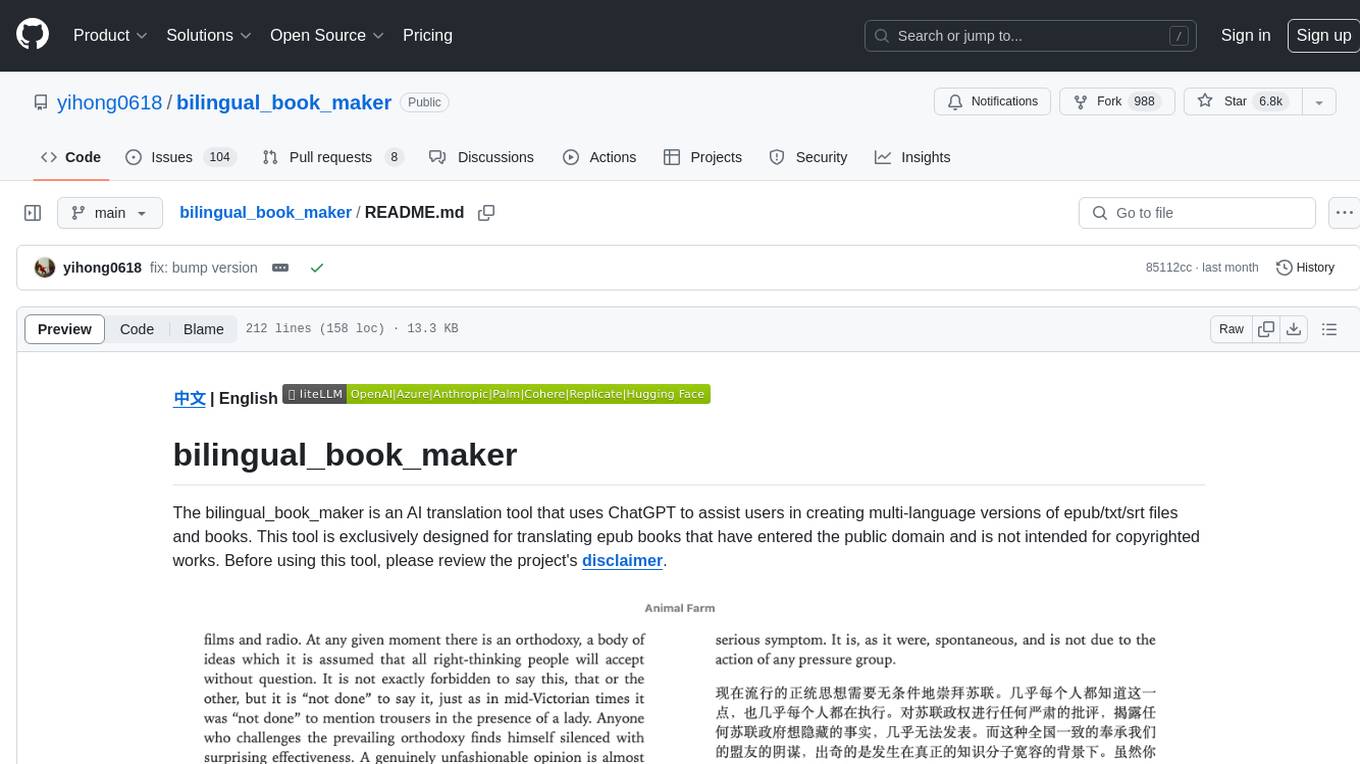
bilingual_book_maker
The bilingual_book_maker is an AI translation tool that uses ChatGPT to assist users in creating multi-language versions of epub/txt/srt files and books. It supports various models like gpt-4, gpt-3.5-turbo, claude-2, palm, llama-2, azure-openai, command-nightly, and gemini. Users need ChatGPT or OpenAI token, epub/txt books, internet access, and Python 3.8+. The tool provides options to specify OpenAI API key, model selection, target language, proxy server, context addition, translation style, and more. It generates bilingual books in epub format after translation. Users can test translations, set batch size, tweak prompts, and use different models like DeepL, Google Gemini, Tencent TranSmart, and more. The tool also supports retranslation, translating specific tags, and e-reader type specification. Docker usage is available for easy setup.
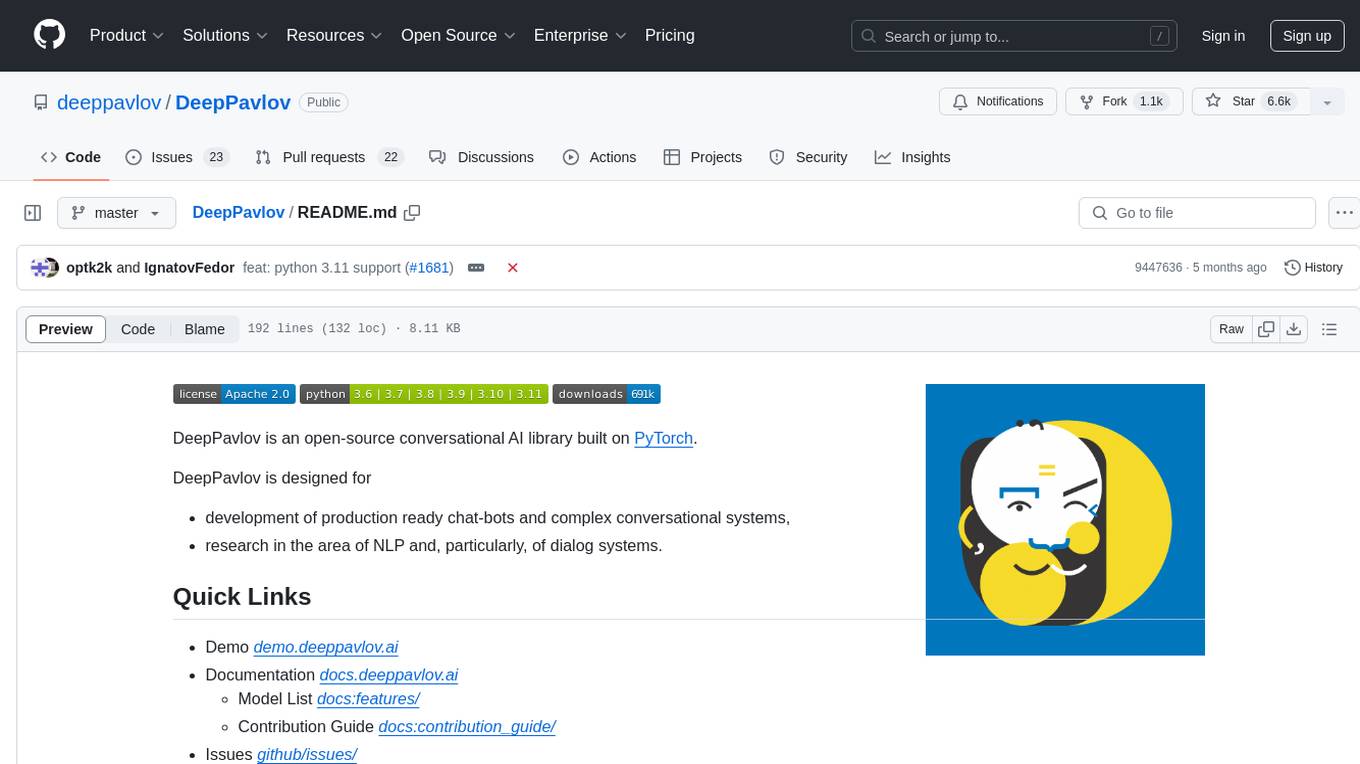
DeepPavlov
DeepPavlov is an open-source conversational AI library built on PyTorch. It is designed for the development of production-ready chatbots and complex conversational systems, as well as for research in the area of NLP and dialog systems. The library offers a wide range of models for tasks such as Named Entity Recognition, Intent/Sentence Classification, Question Answering, Sentence Similarity/Ranking, Syntactic Parsing, and more. DeepPavlov also provides embeddings like BERT, ELMo, and FastText for various languages, along with AutoML capabilities and integrations with REST API, Socket API, and Amazon AWS.
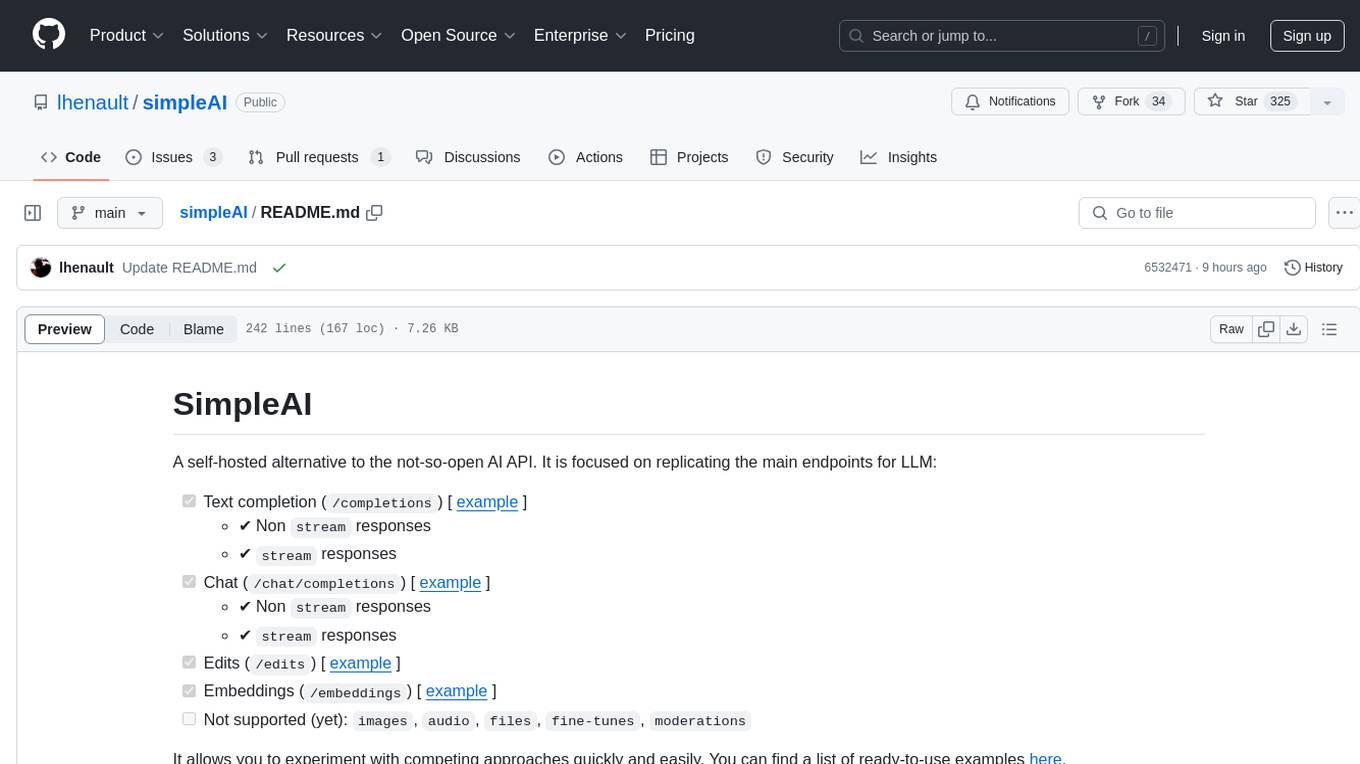
simpleAI
SimpleAI is a self-hosted alternative to the not-so-open AI API, focused on replicating main endpoints for LLM such as text completion, chat, edits, and embeddings. It allows quick experimentation with different models, creating benchmarks, and handling specific use cases without relying on external services. Users can integrate and declare models through gRPC, query endpoints using Swagger UI or API, and resolve common issues like CORS with FastAPI middleware. The project is open for contributions and welcomes PRs, issues, documentation, and more.
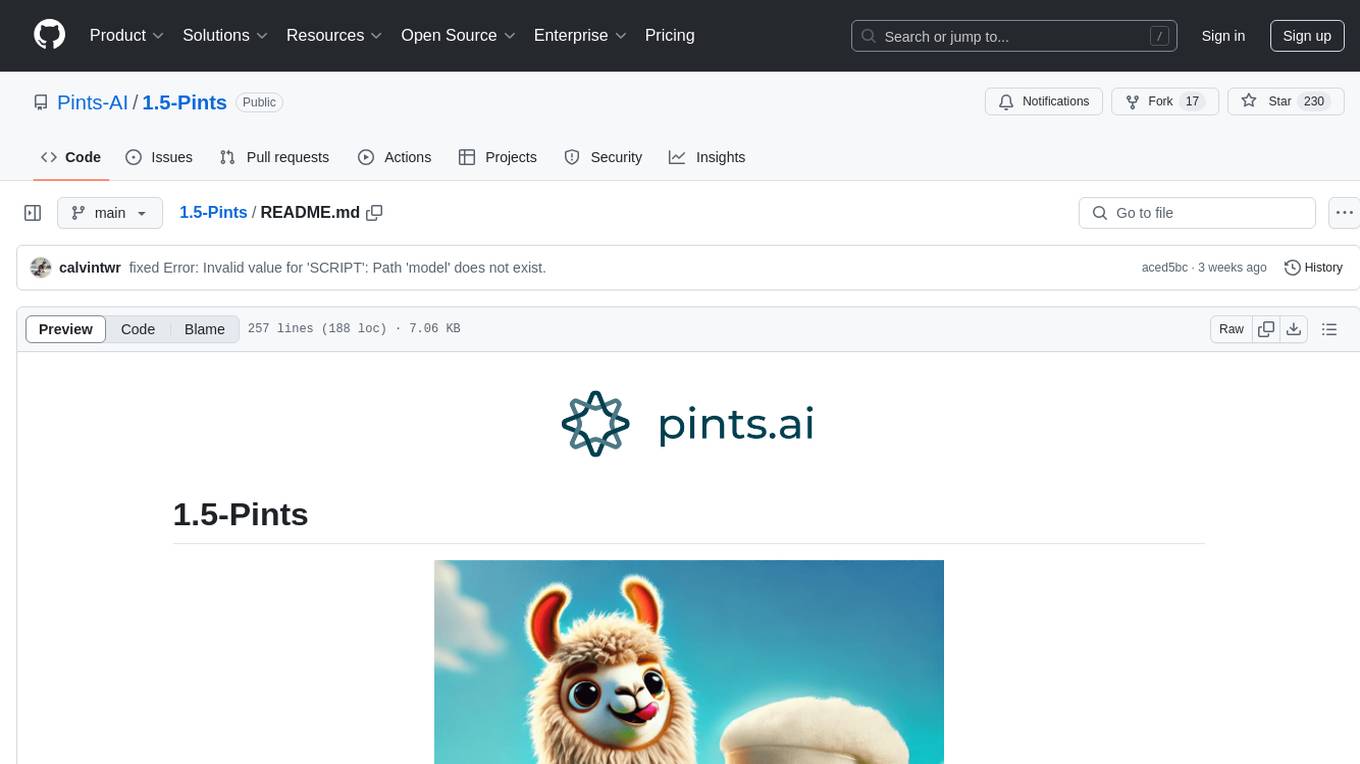
1.5-Pints
1.5-Pints is a repository that provides a recipe to pre-train models in 9 days, aiming to create AI assistants comparable to Apple OpenELM and Microsoft Phi. It includes model architecture, training scripts, and utilities for 1.5-Pints and 0.12-Pint developed by Pints.AI. The initiative encourages replication, experimentation, and open-source development of Pint by sharing the model's codebase and architecture. The repository offers installation instructions, dataset preparation scripts, model training guidelines, and tools for model evaluation and usage. Users can also find information on finetuning models, converting lit models to HuggingFace models, and running Direct Preference Optimization (DPO) post-finetuning. Additionally, the repository includes tests to ensure code modifications do not disrupt the existing functionality.

shellChatGPT
ShellChatGPT is a shell wrapper for OpenAI's ChatGPT, DALL-E, Whisper, and TTS, featuring integration with LocalAI, Ollama, Gemini, Mistral, Groq, and GitHub Models. It provides text and chat completions, vision, reasoning, and audio models, voice-in and voice-out chatting mode, text editor interface, markdown rendering support, session management, instruction prompt manager, integration with various service providers, command line completion, file picker dialogs, color scheme personalization, stdin and text file input support, and compatibility with Linux, FreeBSD, MacOS, and Termux for a responsive experience.
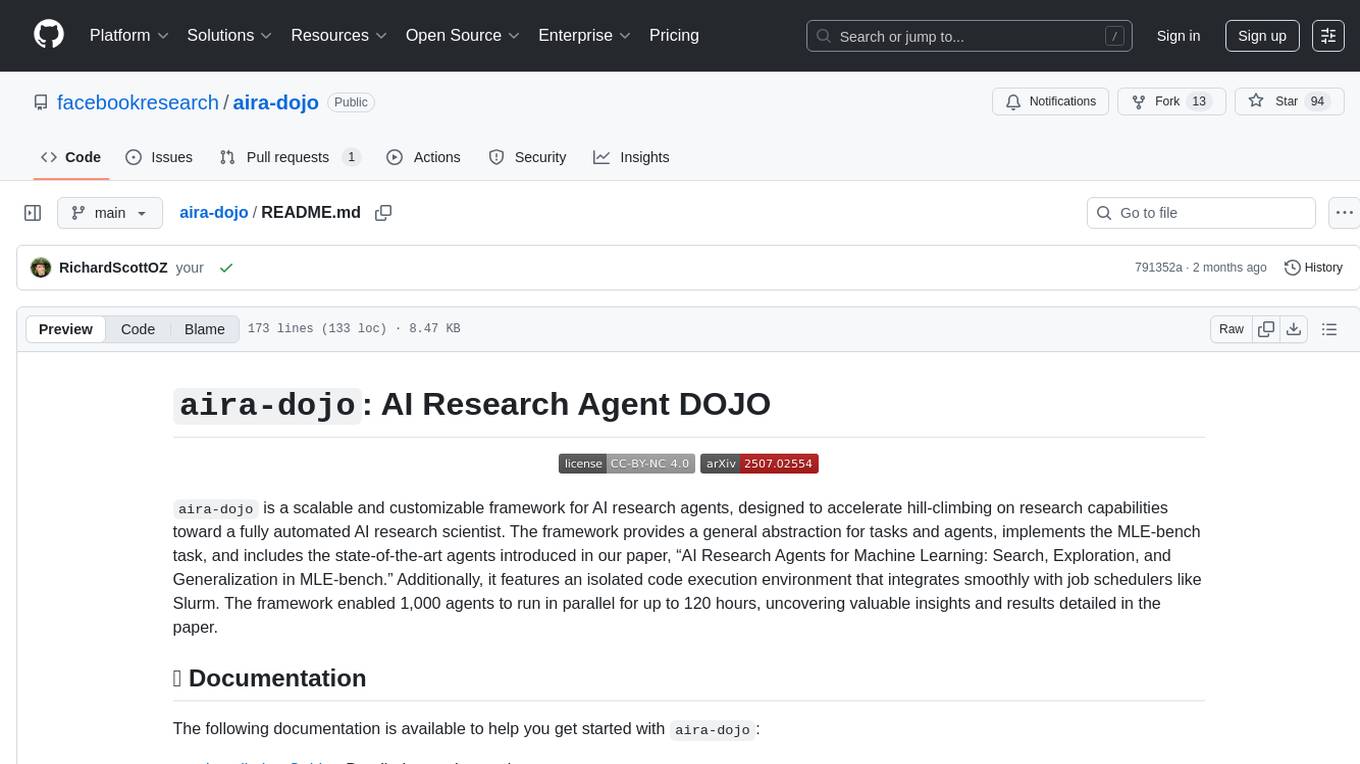
aira-dojo
aira-dojo is a scalable and customizable framework for AI research agents, designed to accelerate hill-climbing on research capabilities toward a fully automated AI research scientist. The framework provides a general abstraction for tasks and agents, implements the MLE-bench task, and includes state-of-the-art agents. It features an isolated code execution environment that integrates smoothly with job schedulers like Slurm, enabling large-scale experiments and rapid iteration across a portfolio of tasks and solvers.
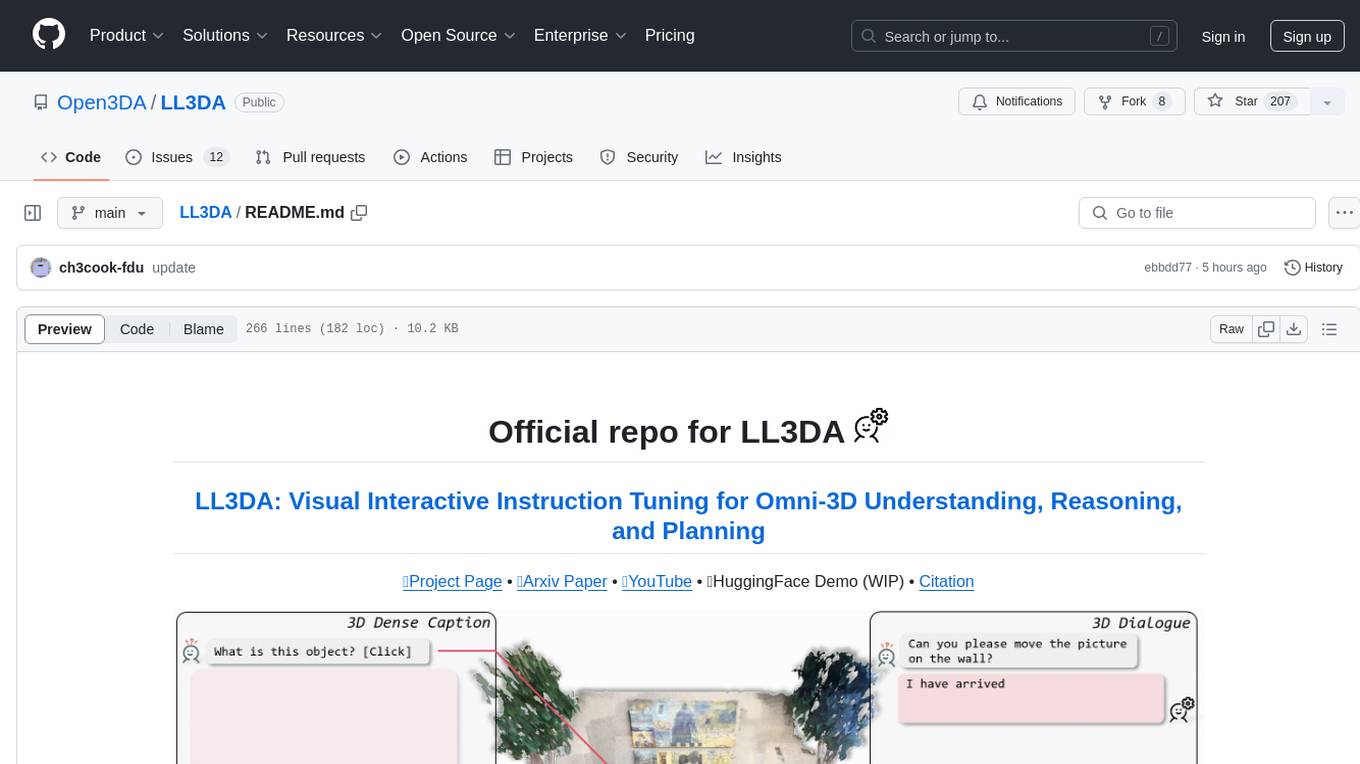
LL3DA
LL3DA is a Large Language 3D Assistant that responds to both visual and textual interactions within complex 3D environments. It aims to help Large Multimodal Models (LMM) comprehend, reason, and plan in diverse 3D scenes by directly taking point cloud input and responding to textual instructions and visual prompts. LL3DA achieves remarkable results in 3D Dense Captioning and 3D Question Answering, surpassing various 3D vision-language models. The code is fully released, allowing users to train customized models and work with pre-trained weights. The tool supports training with different LLM backends and provides scripts for tuning and evaluating models on various tasks.
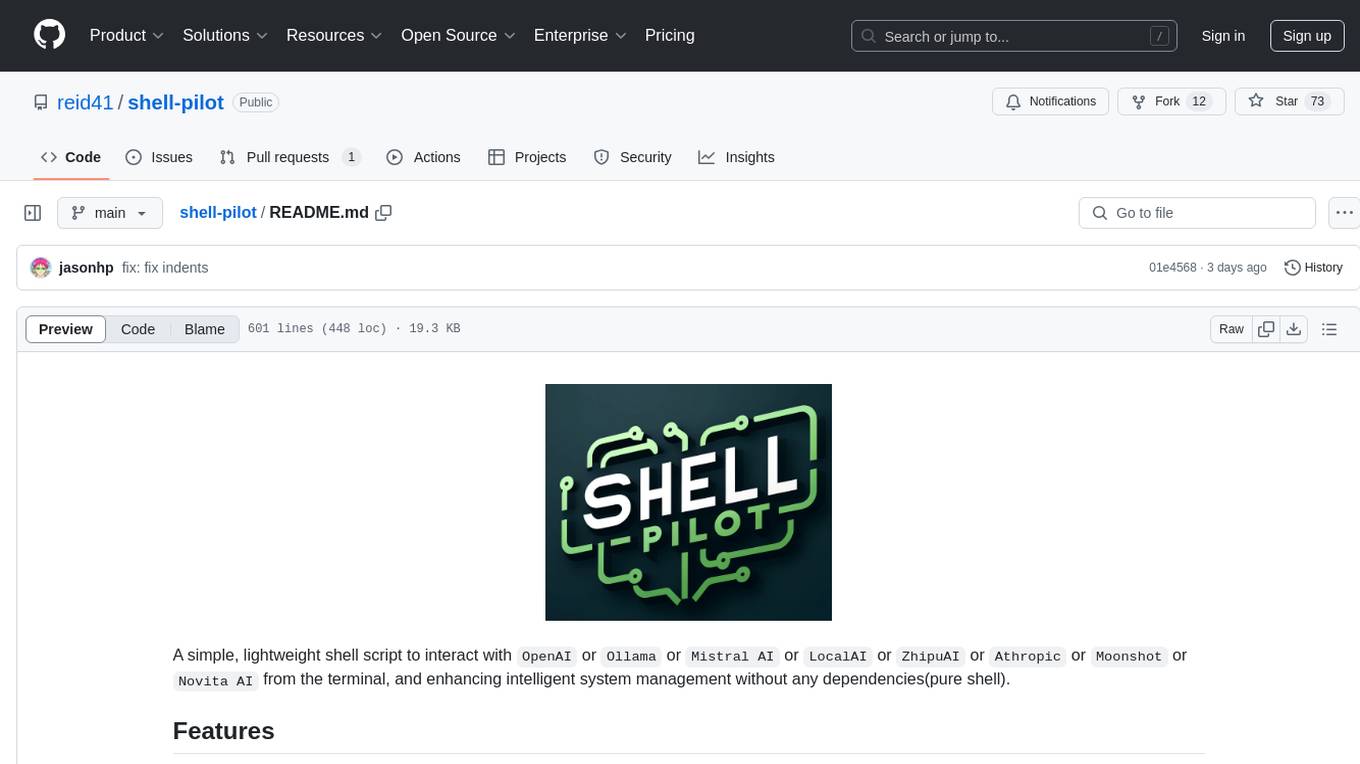
shell-pilot
Shell-pilot is a simple, lightweight shell script designed to interact with various AI models such as OpenAI, Ollama, Mistral AI, LocalAI, ZhipuAI, Anthropic, Moonshot, and Novita AI from the terminal. It enhances intelligent system management without any dependencies, offering features like setting up a local LLM repository, using official models and APIs, viewing history and session persistence, passing input prompts with pipe/redirector, listing available models, setting request parameters, generating and running commands in the terminal, easy configuration setup, system package version checking, and managing system aliases.
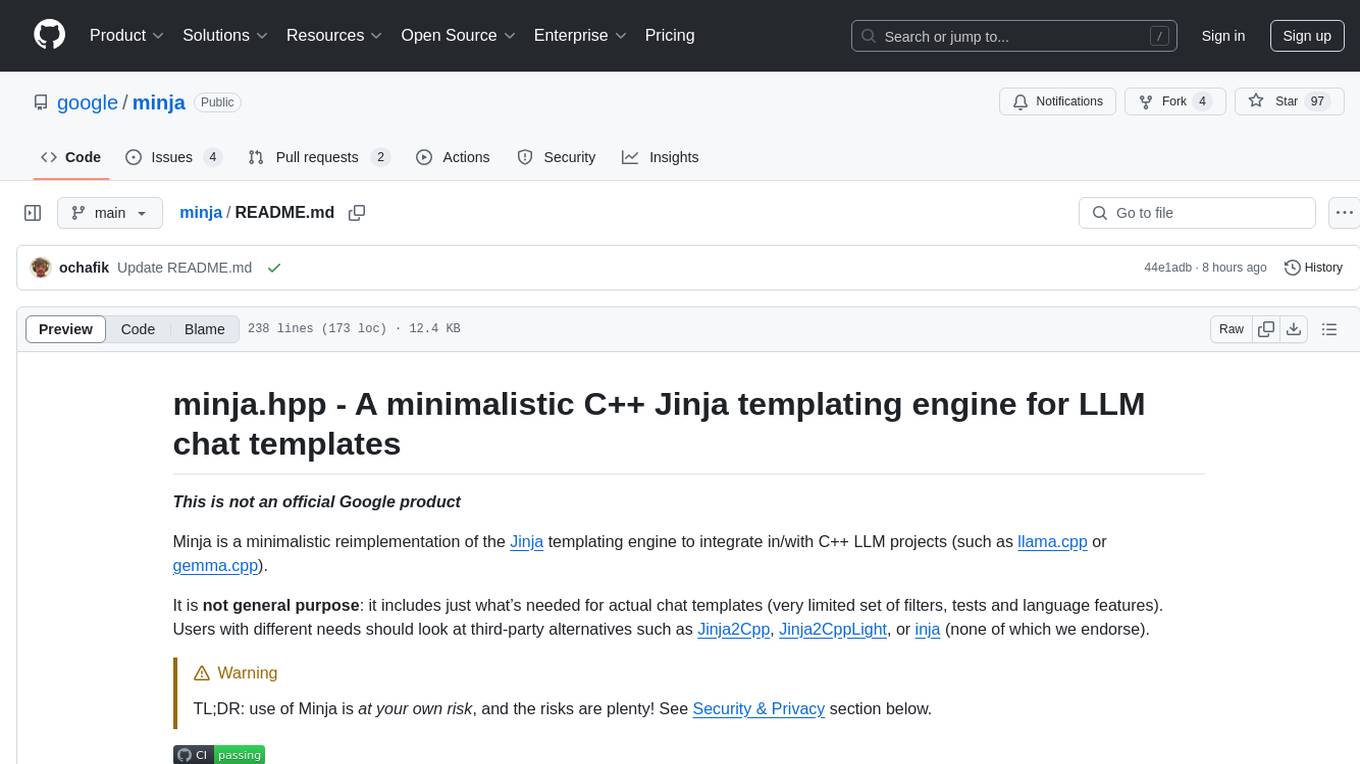
minja
Minja is a minimalistic C++ Jinja templating engine designed specifically for integration with C++ LLM projects, such as llama.cpp or gemma.cpp. It is not a general-purpose tool but focuses on providing a limited set of filters, tests, and language features tailored for chat templates. The library is header-only, requires C++17, and depends only on nlohmann::json. Minja aims to keep the codebase small, easy to understand, and offers decent performance compared to Python. Users should be cautious when using Minja due to potential security risks, and it is not intended for producing HTML or JavaScript output.
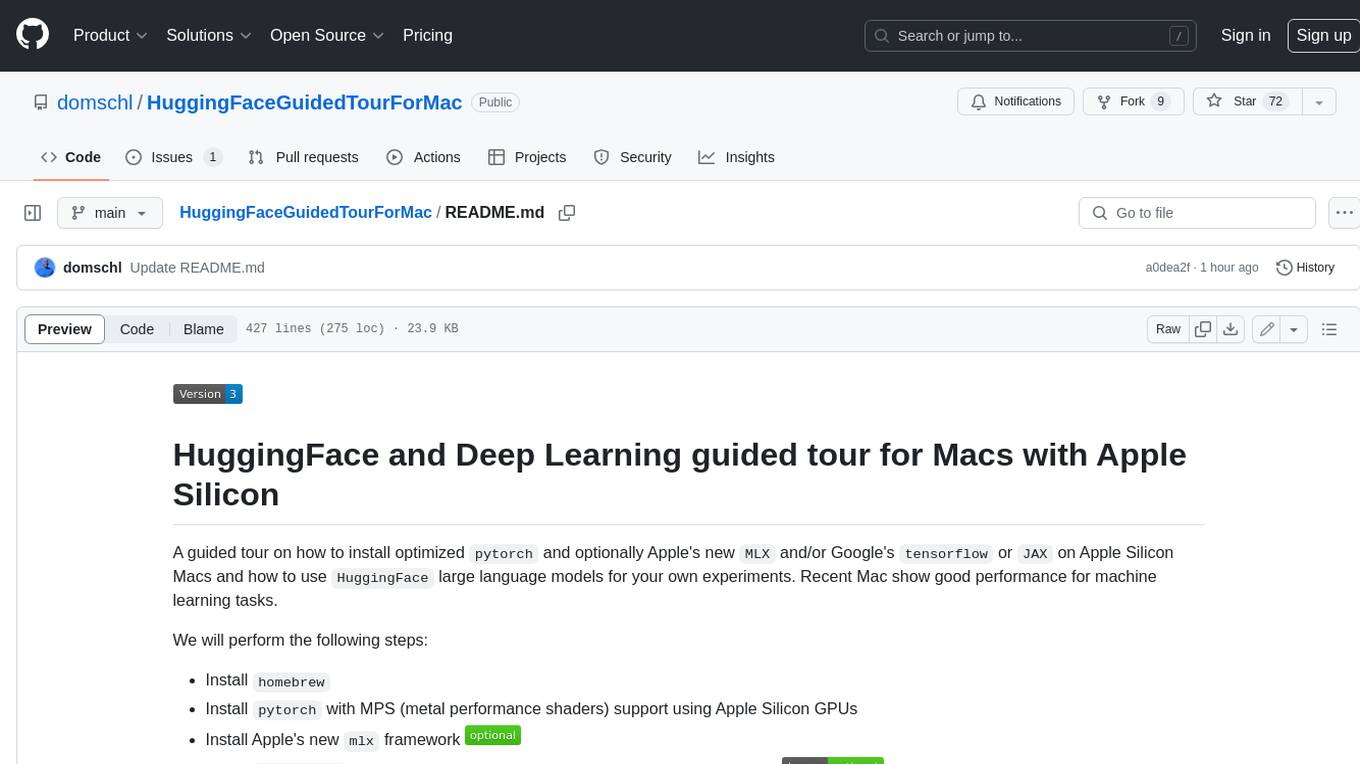
HuggingFaceGuidedTourForMac
HuggingFaceGuidedTourForMac is a guided tour on how to install optimized pytorch and optionally Apple's new MLX, JAX, and TensorFlow on Apple Silicon Macs. The repository provides steps to install homebrew, pytorch with MPS support, MLX, JAX, TensorFlow, and Jupyter lab. It also includes instructions on running large language models using HuggingFace transformers. The repository aims to help users set up their Macs for deep learning experiments with optimized performance.
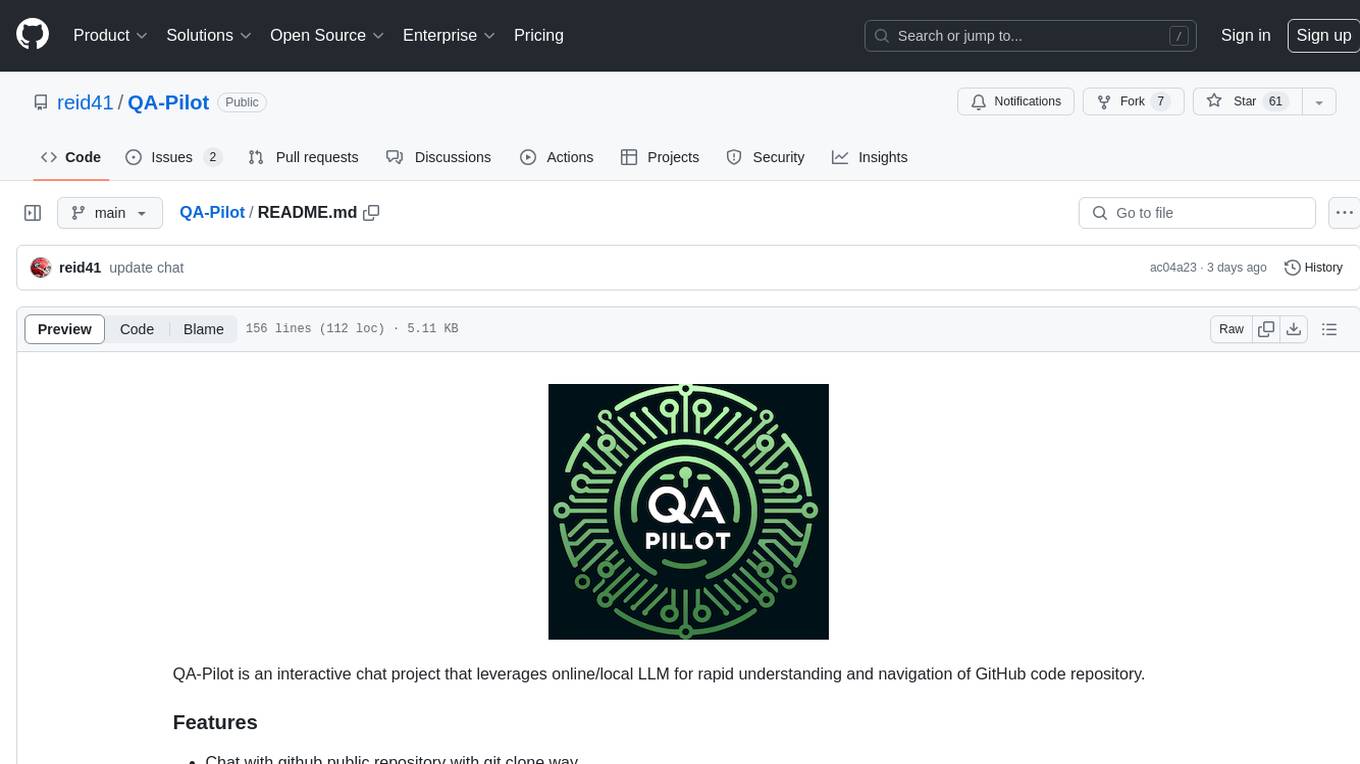
QA-Pilot
QA-Pilot is an interactive chat project that leverages online/local LLM for rapid understanding and navigation of GitHub code repository. It allows users to chat with GitHub public repositories using a git clone approach, store chat history, configure settings easily, manage multiple chat sessions, and quickly locate sessions with a search function. The tool integrates with `codegraph` to view Python files and supports various LLM models such as ollama, openai, mistralai, and localai. The project is continuously updated with new features and improvements, such as converting from `flask` to `fastapi`, adding `localai` API support, and upgrading dependencies like `langchain` and `Streamlit` to enhance performance.
For similar tasks
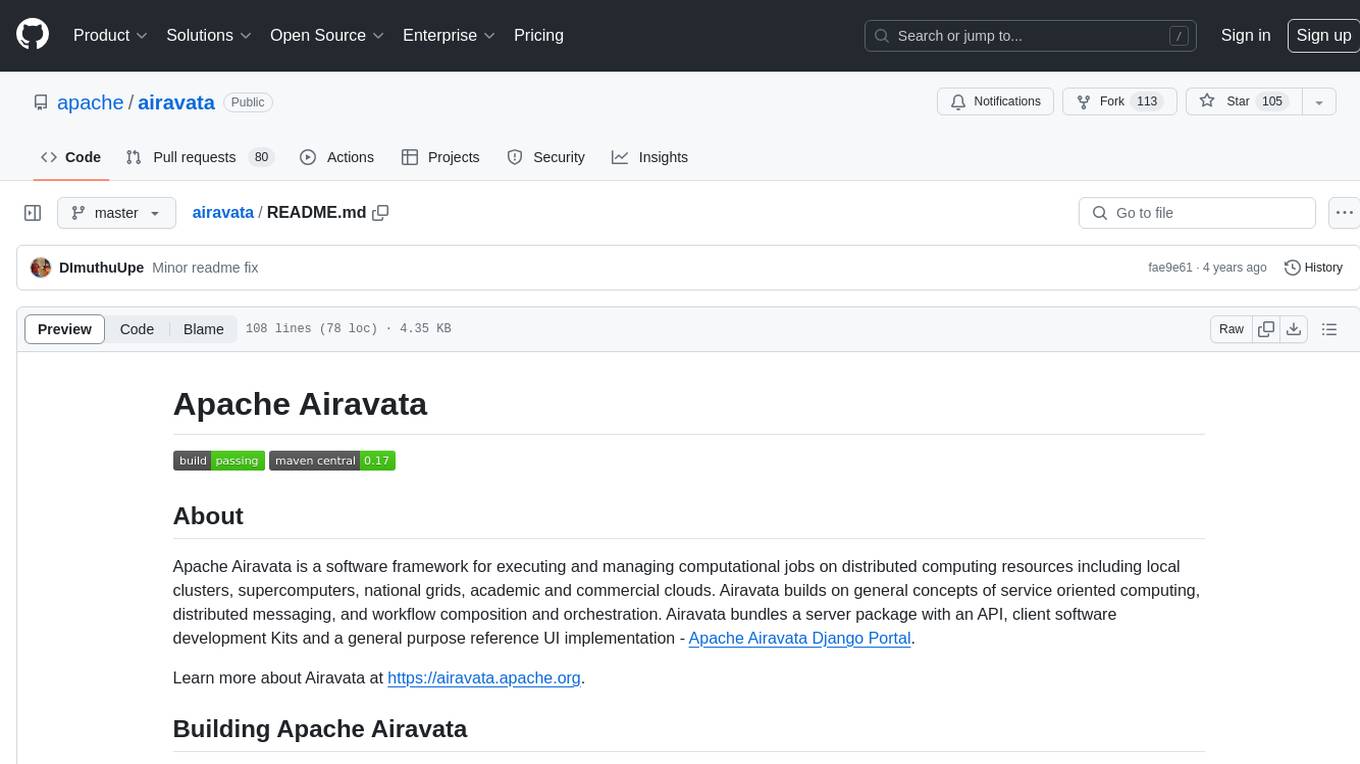
airavata
Apache Airavata is a software framework for executing and managing computational jobs on distributed computing resources. It supports local clusters, supercomputers, national grids, academic and commercial clouds. Airavata utilizes service-oriented computing, distributed messaging, and workflow composition. It includes a server package with an API, client SDKs, and a general-purpose UI implementation called Apache Airavata Django Portal.

CosyVoice
CosyVoice is a tool designed for speech synthesis, offering pretrained models for zero-shot, sft, instruct inference. It provides a web demo for easy usage and supports advanced users with train and inference scripts. The tool can be deployed using grpc for service deployment. Users can download pretrained models and resources for immediate use or train their own models from scratch. CosyVoice is suitable for researchers, developers, linguists, AI engineers, and speech technology enthusiasts.
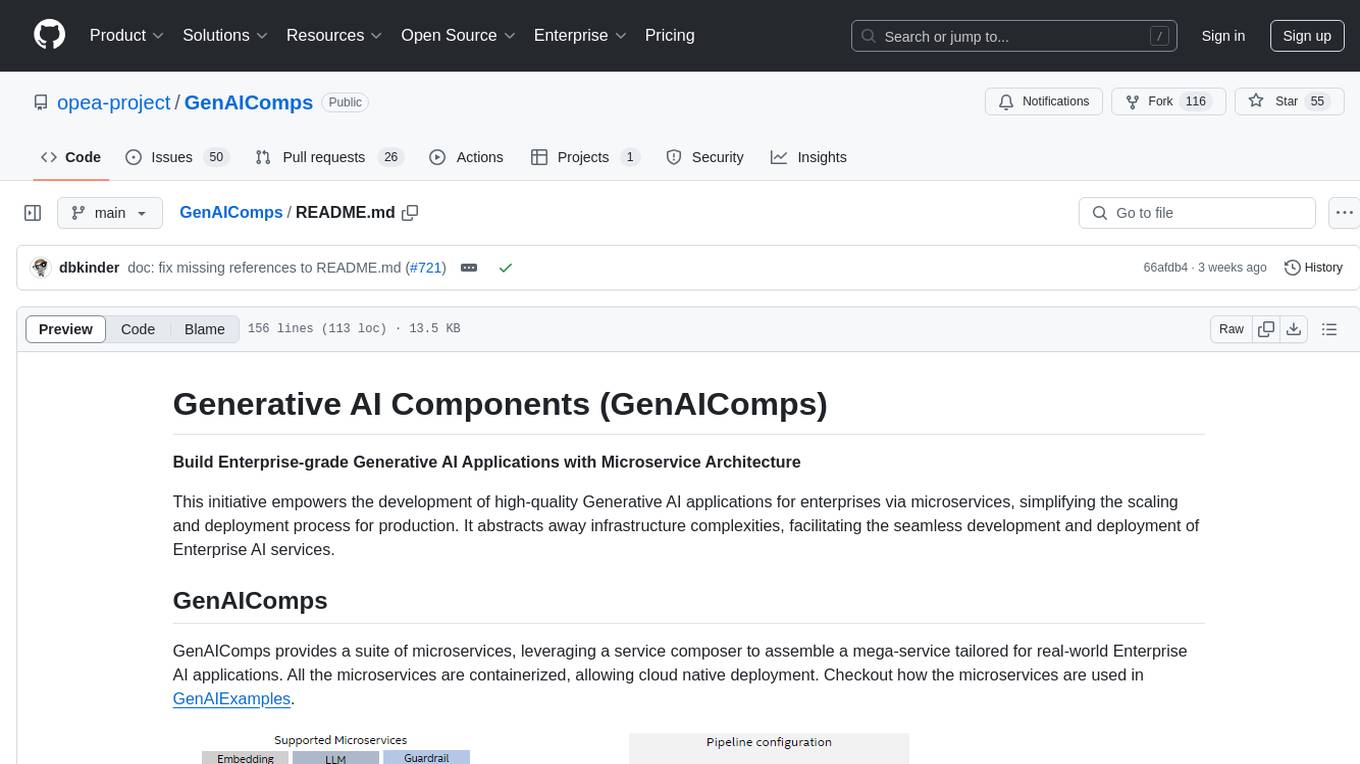
GenAIComps
GenAIComps is an initiative aimed at building enterprise-grade Generative AI applications using a microservice architecture. It simplifies the scaling and deployment process for production, abstracting away infrastructure complexities. GenAIComps provides a suite of containerized microservices that can be assembled into a mega-service tailored for real-world Enterprise AI applications. The modular approach of microservices allows for independent development, deployment, and scaling of individual components, promoting modularity, flexibility, and scalability. The mega-service orchestrates multiple microservices to deliver comprehensive solutions, encapsulating complex business logic and workflow orchestration. The gateway serves as the interface for users to access the mega-service, providing customized access based on user requirements.
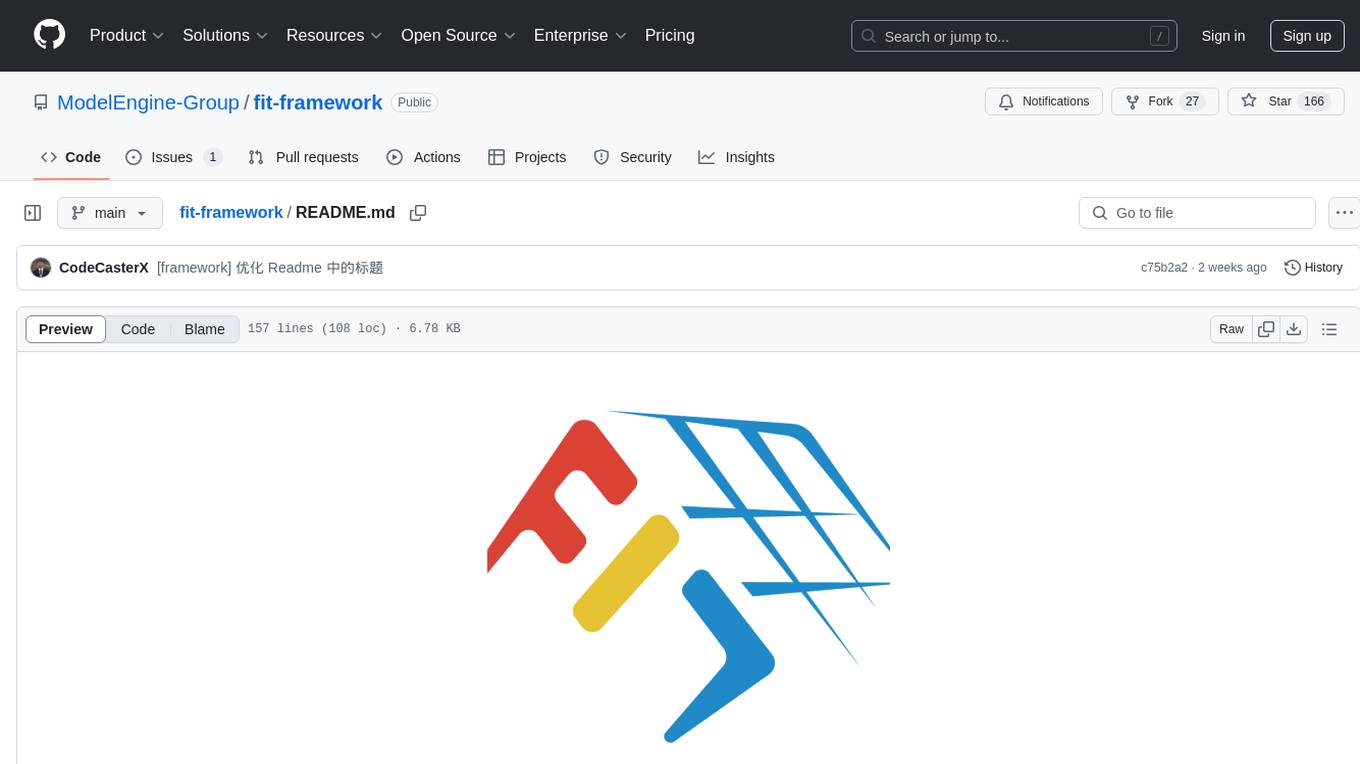
fit-framework
FIT Framework is a Java enterprise AI development framework that provides a multi-language function engine (FIT), a flow orchestration engine (WaterFlow), and a Java ecosystem alternative solution (FEL). It runs in native/Spring dual mode, supports plug-and-play and intelligent deployment, seamlessly unifying large models and business systems. FIT Core offers language-agnostic computation base with plugin hot-swapping and intelligent deployment. WaterFlow Engine breaks the dimensional barrier of BPM and reactive programming, enabling graphical orchestration and declarative API-driven logic composition. FEL revolutionizes LangChain for the Java ecosystem, encapsulating large models, knowledge bases, and toolchains to integrate AI capabilities into Java technology stack seamlessly. The framework emphasizes engineering practices with intelligent conventions to reduce boilerplate code and offers flexibility for deep customization in complex scenarios.
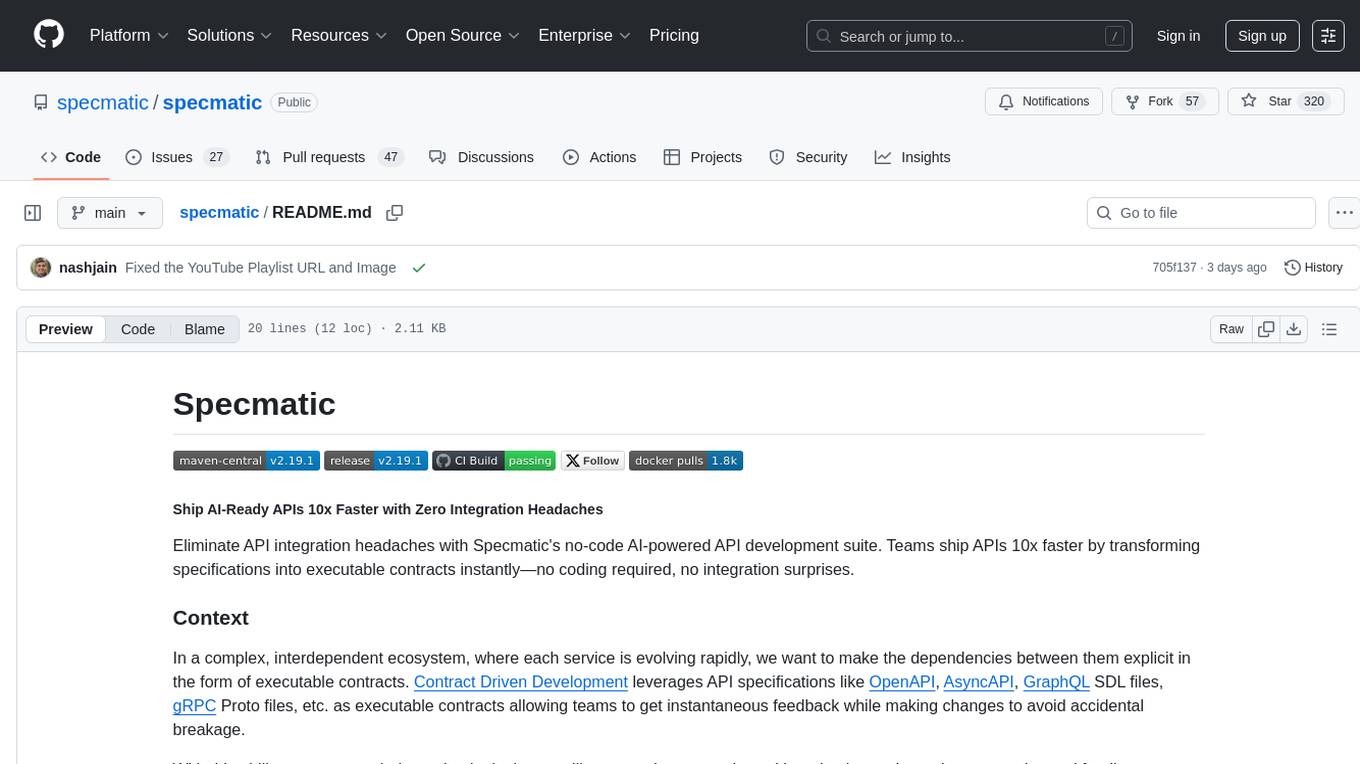
specmatic
Eliminate API integration headaches with Specmatic's no-code AI-powered API development suite. Teams ship APIs 10x faster by transforming specifications into executable contracts instantly—no coding required, no integration surprises. In a complex, interdependent ecosystem, where each service is evolving rapidly, we want to make the dependencies between them explicit in the form of executable contracts. Contract Driven Development leverages API specifications like OpenAPI, AsyncAPI, GraphQL SDL files, gRPC Proto files, etc. as executable contracts allowing teams to get instantaneous feedback while making changes to avoid accidental breakage. With this ability, we can now independently deploy, at will, any service at any time without having to depend on expensive and fragile integration tests.
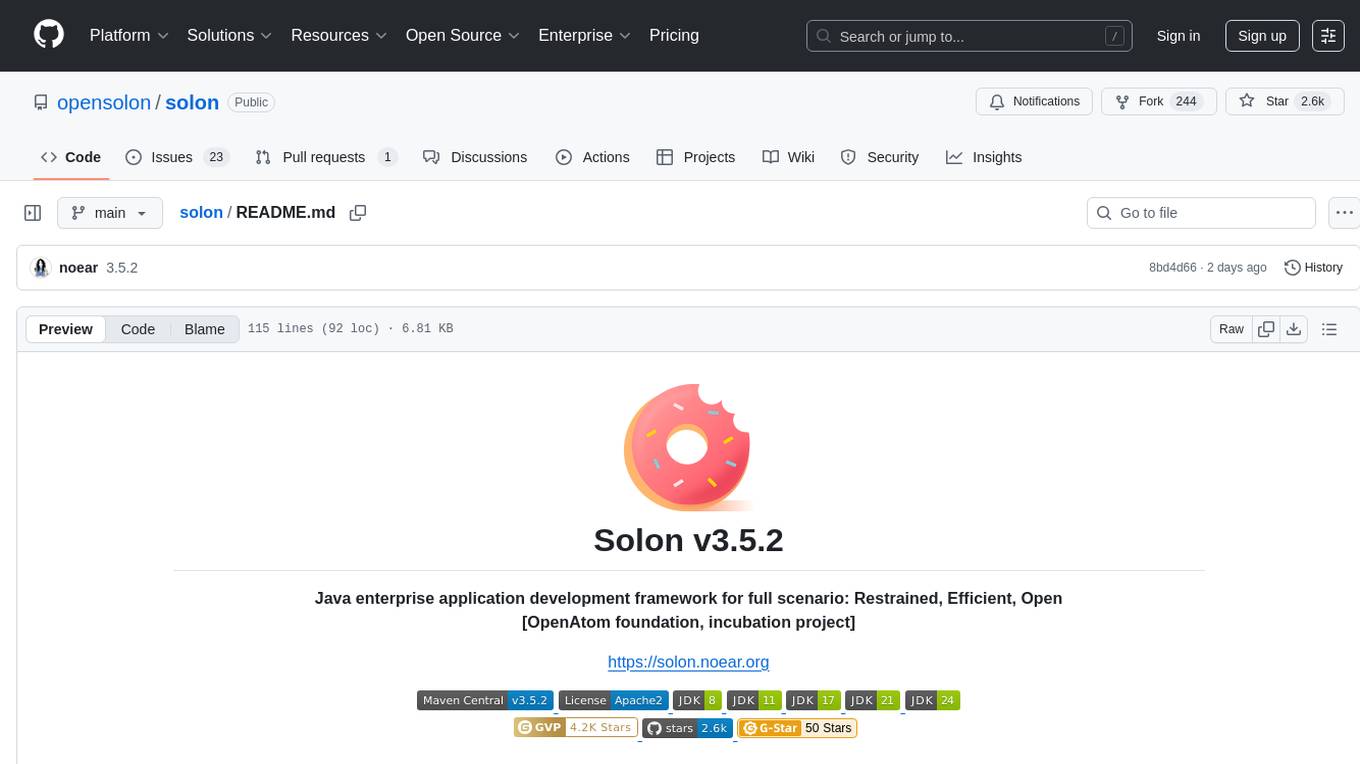
solon
Solon is a Java enterprise application development framework that is restrained, efficient, and open. It offers better cost performance for computing resources with 700% higher concurrency and 50% memory savings. It enables faster development productivity with less code and easy startup, 10 times faster than traditional methods. Solon provides a better production and deployment experience by packing applications 90% smaller. It supports a greater range of compatibility with non-Java-EE architecture and compatibility with Java 8 to Java 24, including GraalVM native image support. Solon is built from scratch with flexible interface specifications and an open ecosystem.
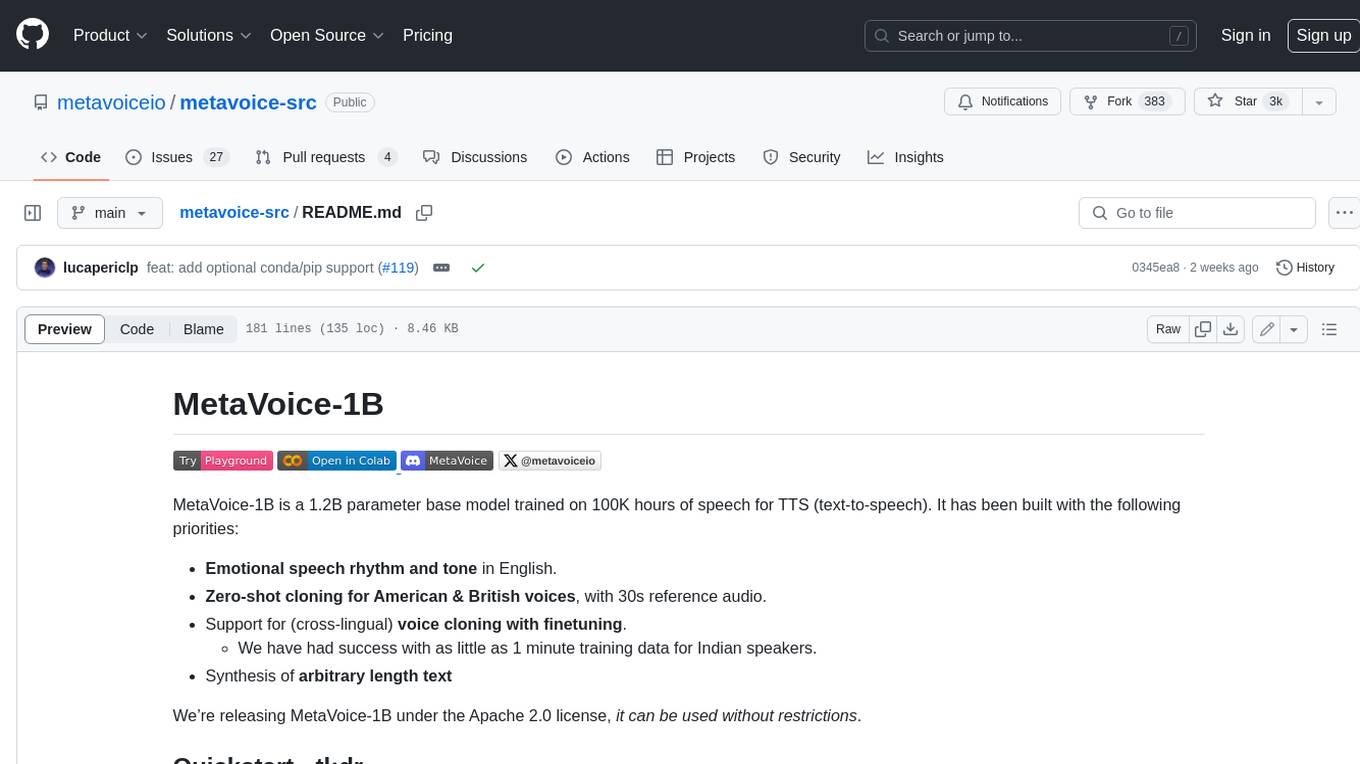
metavoice-src
MetaVoice-1B is a 1.2B parameter base model trained on 100K hours of speech for TTS (text-to-speech). It has been built with the following priorities: * Emotional speech rhythm and tone in English. * Zero-shot cloning for American & British voices, with 30s reference audio. * Support for (cross-lingual) voice cloning with finetuning. * We have had success with as little as 1 minute training data for Indian speakers. * Synthesis of arbitrary length text
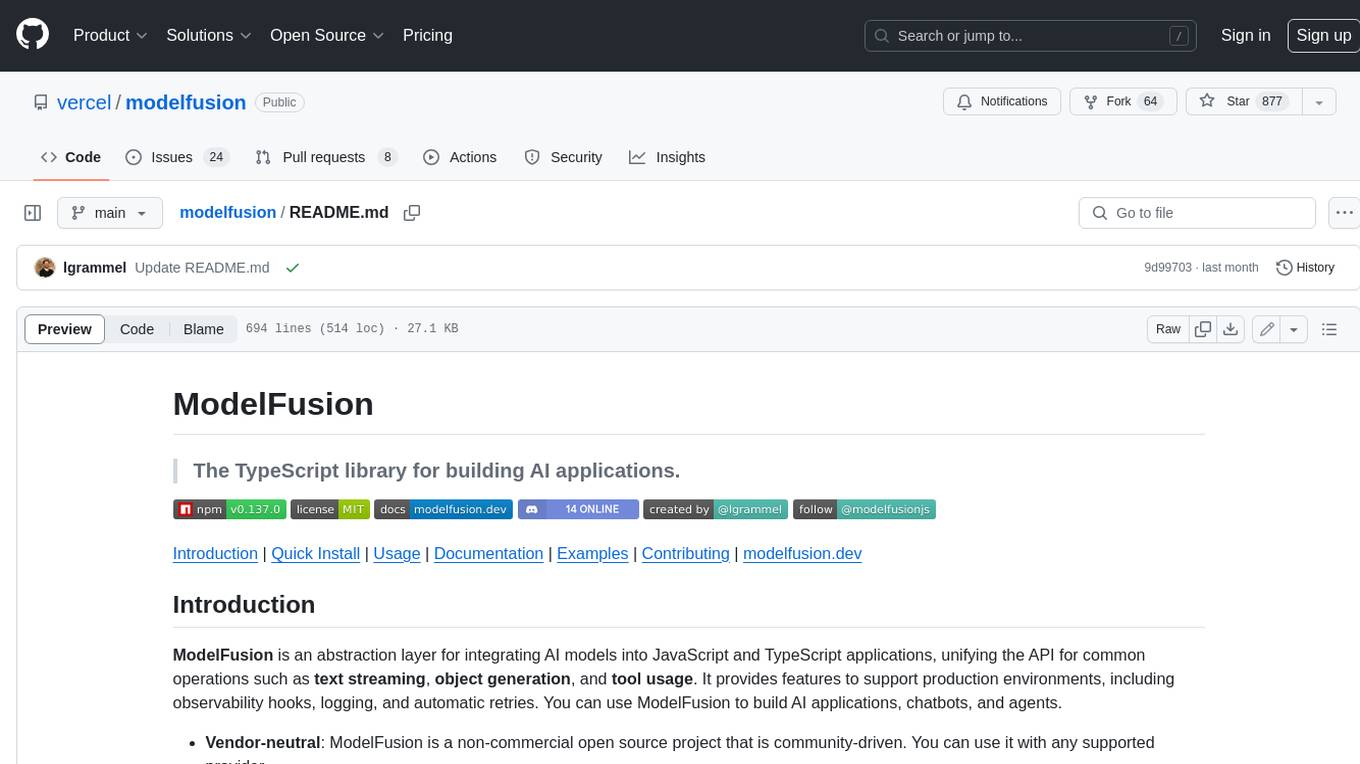
modelfusion
ModelFusion is an abstraction layer for integrating AI models into JavaScript and TypeScript applications, unifying the API for common operations such as text streaming, object generation, and tool usage. It provides features to support production environments, including observability hooks, logging, and automatic retries. You can use ModelFusion to build AI applications, chatbots, and agents. ModelFusion is a non-commercial open source project that is community-driven. You can use it with any supported provider. ModelFusion supports a wide range of models including text generation, image generation, vision, text-to-speech, speech-to-text, and embedding models. ModelFusion infers TypeScript types wherever possible and validates model responses. ModelFusion provides an observer framework and logging support. ModelFusion ensures seamless operation through automatic retries, throttling, and error handling mechanisms. ModelFusion is fully tree-shakeable, can be used in serverless environments, and only uses a minimal set of dependencies.
For similar jobs

sweep
Sweep is an AI junior developer that turns bugs and feature requests into code changes. It automatically handles developer experience improvements like adding type hints and improving test coverage.

teams-ai
The Teams AI Library is a software development kit (SDK) that helps developers create bots that can interact with Teams and Microsoft 365 applications. It is built on top of the Bot Framework SDK and simplifies the process of developing bots that interact with Teams' artificial intelligence capabilities. The SDK is available for JavaScript/TypeScript, .NET, and Python.

ai-guide
This guide is dedicated to Large Language Models (LLMs) that you can run on your home computer. It assumes your PC is a lower-end, non-gaming setup.

classifai
Supercharge WordPress Content Workflows and Engagement with Artificial Intelligence. Tap into leading cloud-based services like OpenAI, Microsoft Azure AI, Google Gemini and IBM Watson to augment your WordPress-powered websites. Publish content faster while improving SEO performance and increasing audience engagement. ClassifAI integrates Artificial Intelligence and Machine Learning technologies to lighten your workload and eliminate tedious tasks, giving you more time to create original content that matters.

chatbot-ui
Chatbot UI is an open-source AI chat app that allows users to create and deploy their own AI chatbots. It is easy to use and can be customized to fit any need. Chatbot UI is perfect for businesses, developers, and anyone who wants to create a chatbot.

BricksLLM
BricksLLM is a cloud native AI gateway written in Go. Currently, it provides native support for OpenAI, Anthropic, Azure OpenAI and vLLM. BricksLLM aims to provide enterprise level infrastructure that can power any LLM production use cases. Here are some use cases for BricksLLM: * Set LLM usage limits for users on different pricing tiers * Track LLM usage on a per user and per organization basis * Block or redact requests containing PIIs * Improve LLM reliability with failovers, retries and caching * Distribute API keys with rate limits and cost limits for internal development/production use cases * Distribute API keys with rate limits and cost limits for students

uAgents
uAgents is a Python library developed by Fetch.ai that allows for the creation of autonomous AI agents. These agents can perform various tasks on a schedule or take action on various events. uAgents are easy to create and manage, and they are connected to a fast-growing network of other uAgents. They are also secure, with cryptographically secured messages and wallets.

griptape
Griptape is a modular Python framework for building AI-powered applications that securely connect to your enterprise data and APIs. It offers developers the ability to maintain control and flexibility at every step. Griptape's core components include Structures (Agents, Pipelines, and Workflows), Tasks, Tools, Memory (Conversation Memory, Task Memory, and Meta Memory), Drivers (Prompt and Embedding Drivers, Vector Store Drivers, Image Generation Drivers, Image Query Drivers, SQL Drivers, Web Scraper Drivers, and Conversation Memory Drivers), Engines (Query Engines, Extraction Engines, Summary Engines, Image Generation Engines, and Image Query Engines), and additional components (Rulesets, Loaders, Artifacts, Chunkers, and Tokenizers). Griptape enables developers to create AI-powered applications with ease and efficiency.
